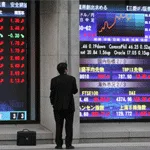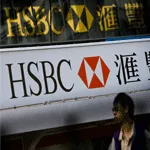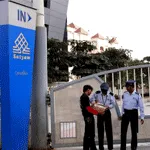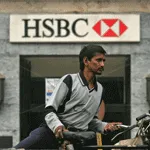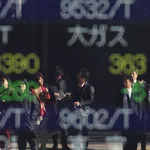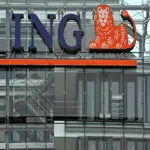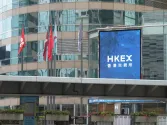Singapore
MUFG reports financial results for 9 months of FY08
MUFG reports financial results for 9 months of FY08
Mitsubishi UFJ Financial Group reported its financial results and said its total assets as of December 31, 2008 increased by 5,898.4 billion yen from March 31, 2008 to 198,891.6 billion yen, and total net assets as of December 31, 2008 decreased by 406.9 billion yen from March 31, 2008 to 9,192.7 billion yen. The decrease in total net assets reflected a decrease of total valuation and translation adjustments by 1,168.2 billion yen, which were mainly due to a decrease of net unrealised gains (losses) on other securities reflecting the decline of share prices, even though total shareholders' equity increased by 752.5 billion yen due to the issuance of new shares and preferred shares through a third-party allotment, and the sale of treasury shares.
Crisis disrupts Asia's domestic bond markets
Turmoil in global credit markets is taking its toll on Asia’s emerging domestic bond markets, according to the results of the most recent Greenwich Associates Asian Fixed Income Research Study. Asian domestic bond markets grew at a furious pace in the years leading up to the current global financial crisis. Trading volumes in the domestic currency bond markets of countries like China, Indonesia, Malaysia, India, Thailand and Australia/New Zealand increased more than 135 percent from 2006 to 2007 alone. As a result of this expansion, local currency products grew to make up over 50 percent of overall fixed-income trading volume across Asia in 2006 to 2007, up from just 30 percent the year before.The onset of the global credit crisis stopped this growth in its tracks over the past year as local currency bond markets in many major Asian countries experienced severe retrenchment. Domestic currency fixed-income trading volume fell some 47 percent in India and contracted by about one third in China and Australia/New Zealand. These declines shrunk local-currency business to less than a third of total Asian fixed-income trading volume from 2007 to 2008.“The development of these markets represented a profound shift for Asian financial markets,” says Greenwich Associates consultant Tim Sangston. “In the past, large Asian companies that earned most of their revenues in local currency had to obtain most of their long-term financing in dollars or European currencies—which history has proven is a dangerous position to be in. The emergence of thriving local-currency debt markets has been seen as an important new source of stability, but the severity of the current financial crisis leaves the near-term fate of these markets in real doubt.”Surge in G-7 bonds boosts total trading volumeDespite the contraction in domestic markets—or perhaps because of it to some extent— overall Asian fixed-income trading volume (including derivatives) among investors interviewed by Greenwich Associates increased 35 percent to $2.3 trillion in 2007 to 2008. Trading volume in cash bonds was up 15 percent.Much of that growth came about as a result of a surge of activity among institutions in Asian bonds denominated in the currencies of G-3 and G-7 countries, in which trading volumes doubled from 2007 to 2008. “This is a classic flight to quality on an historic scale,” says Tim Sangston. “Institutions are shifting en masse from local-currency bonds to Asian credit products denominated in G-3 and G-7 currencies.”Asian institutional trading volumes in G-3 denominated Asian bonds soared 90 percent to $214 billion in 2007 to 2008. Fueling that growth was a dramatic spike in activity in G-3 denominated investment-grade sovereign/corporate issues, in which trading volume increased nearly four-fold, and in G-3 high-yield bonds, in which trading volumes more than tripled.Overall trading volume in investment-grade credit products issued by companies in G-7 countries increased to $163 billion amongst Asian institutions in 2007 to 2008, up 55 percent from the prior year. Much of that growth occurred in G-7 credit default swaps and index products, in which trading volume tripled year-over-year. Trading volumes in interestrate derivatives also skyrocketed among Asian institutions, more than doubling to $722 billion. “Investors were actively looking to lock in hedges on the back of other investments,” says Tim Sangston.Flight to quality shakes up dealer rankingsRetrenchment in domestic Asian bond markets is having a significant impact on the fortunes of the major broker-dealers competing for the fixed-income trading business of Asian institutions. In short: Dealers that have invested heavily to build a presence in local currency bond markets are feeling some real pain.As part of its 2008 Asian Fixed-Income Investors Study, Greenwich asked nearly 770 institutional investors to name the dealers they use for their fixed-income trading business, to specify how much of their total trading business they allocate to each dealer in specific products and to rate the quality of service each dealer delivers. Based on the results of this research, Greenwich Associates compiles its Dealer Market Share Rankings, and identifies the Greenwich Quality Leaders for Asian Fixed-Income. HSBC rose to the top of Greenwich Associates’ Asian Fixed Income Dealer Rankings in 2007 to 2008 with a 12.1-percent market share in overall trading. Citigroup ranked second in this year’s rankings with 9.6-percent market share in Asian fixed-income trading, followed by Deutsche Bank at a 9.3- percent share.“It is interesting to note that among all the major dealers competing in Asia, HSBC has built the biggest trading franchise in local-currency products,” says Tim Sangston. “But the banks’ strength in other areas and its market-leading scores for overall franchise quality over the course of the credit crisis have enabled it to weather the storm in Asia to this point.”
HSBC is adviser to China Overseas Land & Investment
HSBC acted as the Sole Financial Adviser to China Overseas Land & Investment Ltd. (COLI) on its HK$2.5-billion Open Offer announced on 10 December 2008. The Open Offer was completed on 30 January 2009 and achieved 16.6 times oversubscription of shares available for excess application.
Nomura launches Investment Banking operations in India
Nomura Financial Advisory and Securities (India) Private Ltd. (Nomura India), a wholly owned subsidiary of Nomura Holdings, Inc. (Nomura), has launched its Equity Sales and Trading and Investment Banking operations in India.
Asia Pacific private equity fund pool tops $218 billion
The Asian Venture Capital Journal (AVCJ) has announced its full-year research figures for 2008. The Asian Private Equity and Venture Capital Report shows that Asian private equity enjoyed strong growth throughout the last year, with total capital management for the region breaking through the US$200 billion level for the first time to reach just over US$218 billion, and growing at an annualised rate of 14.4 percent. Trade sale exits also showed a 2.2-percent rise to US$35.3 billion in 2008, sign of a healthy turnover in the industry. However, most other areas of activity, including fundraising, investments, and IPO exits, fell from their 2007 peaks during 2008—sharply in some cases.
'Friend or Foe?' Cautions CFA Institute on Related-Party Transactions
"The Satyam fraud case illustrates that where there is little separation of ownership and control, minority shareholders need to voice their opinion or run the risk of having their rights significantly compromised," said Lee Kha Loon, CFA, Asia Pacific head of the CFA Institute Centre for Financial Market Integrity, with the release of its study titled "Related-Party Transactions: Cautionary Tales for Investors in Asia".
Cannon to lead HSBC's Global Markets in Korea
HSBC announced the appointment of Matthew Cannon as managing director, treasurer and head of Global Markets, Korea. Cannon is responsible for managing the bank’s Global Markets activities including foreign exchange and money markets as well as fixed income and derivative trading and sales.
IL&FS Investsmart Ltd. announces 3Q results
IL&FS Investsmart Ltd., an Indian incorporated and 93.86-percent owned subsidiary company of HSBC Holdings plc, has reported a consolidated net loss of Rs67.73 crore (US$13.90 million) for the quarter ended 31 December 2008. This compares to a net loss of Rs26.11 crore (US$5.36 million) for the previous quarter and a net profit of Rs20.56 crore (US$4.22 million) for the quarter ended 31 December 2007.
Nomura sets up Islamic fund management firm in Malaysia
Nomura Asset Management Co., Ltd., a wholly owned subsidiary of Nomura Holdings, Inc., announced on January 30 the establishment of Nomura Islamic Asset Management Sdn. Bhd. (NIAM), an Islamic fund management firm based in Kuala Lumpur, Malaysia.
Liquidity in global markets is possible to restore - Western Asset
Western Asset Management, the leading global fixed income manager wholly owned by Legg Mason, Inc., said it is difficult to forecast when the current process of deleveraging will end or when liquidity will return to the marketplace, but policymakers in most countries seem determined to avoid erring on the side of doing too little.
Instinet becomes Australian Clearing member
Instinet Inc., a global leader in electronic trading and agency-only brokerage services, today announced that its Instinet Australia Clearing Services Pty Ltd. subsidiary has secured membership on the ASX Settlement and Transfer Corp. (ASTC), which is a wholly-owned subsidiary of the Australian Securities Exchange (ASX), and has been successfully clearing and settling client trades for the past three months.
Nomura reports Q3 financial results
Nomura Holdings, Inc. reported on January 27 its consolidated financial results for the third quarter of the fiscal year ending March 31, 2009.
Nomura meets target dividend
Nomura Holdings Inc. today announced a third quarter dividend for the fiscal year ending March 31, 2009, of 8.5 yen per share, in line with its target dividend.
ING to counter economic woes
ING announced January 26, 2009 that it is taking measures to counter the implications of the persistently challenging economic and market conditions. In order to adapt the organisation to the new business environment, ING is taking several steps to reduce risk and expenses and increase focus on its core savings and investment business.
ING appoints Hommen to replace Tilmant as CEO
ING, a global financial institution of Dutch origin, announced today that in light of the extraordinary developments over the past few months and given his personal condition, Michel Tilmant will step down from the Executive Board as of today. Michel Tilmant will be an advisor to the company until his retirement from ING on August 1, 2009.
Morgan Stanley: 'What the Singapore govt can and should do'
The government announced the FY2009 budget on the evening of January 22, bringing it forward from the usual February timetable in light of the severity of the macro downturn. Overall, the budget is constructive and expansionary in our view. The government expects a fiscal deficit of -3.5 percent of GDP for FY2009 (versus -0.8 percent of GDP for FY2008). For basic balance (which excludes top-ups to endowment and trust funds and net investment income/returns revenue), it expects -6.0 percent of GDP (versus -1.0 percent of GDP in FY2008). Specifically, government revenue is expected to fall from 15.1 percent of GDP in FY2008 to 13.4 percent in FY2009. Total expenditure (including special transfers) is expected to increase from 17.2 percent of GDP to 20 percent of GDP in FY2009. In terms of size, the budget announced is in line with our overall expectation of 3-percent fiscal stimulus (i.e. increase in expenditure), dated January 13, 2009). We maintain our view of -3.5-percent YoY GDP growth for 2009 and +3.0 percent YoY for 2010.
Change to Exchange Price
Aberdeen Asset Management PLC ("the Company") and Aberdeen Warrants (Jersey) Limited announce that, following the approval of the final dividend at the Company's Annual General Meeting, the Exchange Price of the Warrants, forming part of the Company's Convertible Preference Share Units, will reduce from 97.00 pence per Ordinary Share to 94.00 pence per Ordinary Share effective immediately.

